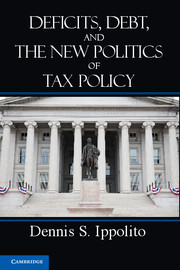Book contents
- Frontmatter
- Contents
- Figures and Tables
- Preface
- 1 A Brief History of Federal Taxation
- 2 The Stable Era – World War II to the 1960s
- 3 Destabilizing Tax Policy – Vietnam and the 1970s
- 4 The Reagan Strategy – Balancing Low
- 5 The Clinton Strategy – Balancing High
- 6 Bush, Obama, and Fiscal Deadlock
- 7 Reconnecting Taxes and Budgets
- Index
- References
4 - The Reagan Strategy – Balancing Low
Published online by Cambridge University Press: 05 December 2012
- Frontmatter
- Contents
- Figures and Tables
- Preface
- 1 A Brief History of Federal Taxation
- 2 The Stable Era – World War II to the 1960s
- 3 Destabilizing Tax Policy – Vietnam and the 1970s
- 4 The Reagan Strategy – Balancing Low
- 5 The Clinton Strategy – Balancing High
- 6 Bush, Obama, and Fiscal Deadlock
- 7 Reconnecting Taxes and Budgets
- Index
- References
Summary
The Reagan presidency began with a lofty fiscal agenda. The administration's March 1981 Budget Revisions vowed to “substantially alter the previous Administration's tax and spending policies” and to balance the budget in 1984 at precisely 19.3 percent of GNP – “significantly lower levels than under previous [Carter administration] policy.” The spending and tax components of the Reagan program marked a sharp departure not only from Carter policies but also from budget policy trends of the 1970s. Reagan's plan to revive the American economy featured large and permanent individual tax cuts that would reduce and stabilize revenue levels. His pledge to restore American military supremacy required much larger defense budgets, while the promise to cut the growth of government spending translated into even larger cutbacks in domestic spending. The Reagan version of a balanced budget began with a low revenue ceiling that would be matched by “the reduced size of the public sector.”
Reagan's plan for balancing the budget proved to be wildly optimistic, and not just during 1984. Over Reagan's two terms, spending averaged more than 22 percent of GNP, while revenues averaged slightly more than 18 percent. Instead of balanced budgets, the Reagan years produced unusually large deficits and a near tripling of the publicly held debt. When Reagan took office, publicly held debt–GNP was approximately 25 percent. By the end of the decade, it had climbed to more than 40 percent.
- Type
- Chapter
- Information
- Deficits, Debt, and the New Politics of Tax Policy , pp. 112 - 156Publisher: Cambridge University PressPrint publication year: 2012



